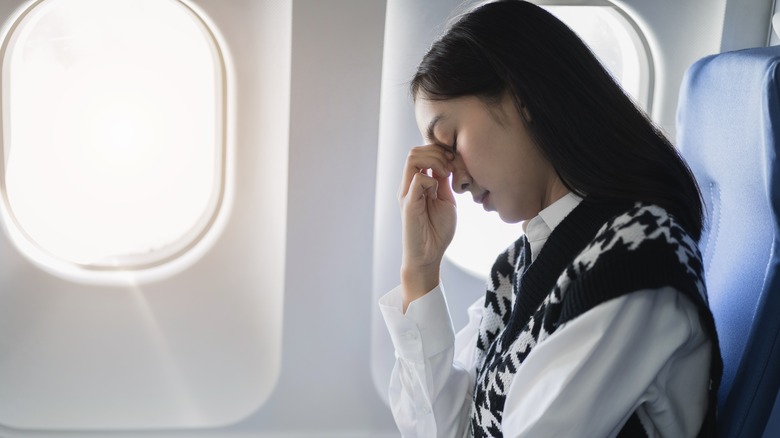The Surprising Reason To Avoid Flying With A Stuffy Nose
There is nothing quite like the feeling of anxiously sitting in a plane as it speeds down the tarmac, ready for takeoff. But, as the gigantic metal beasts lift off the ground, that anxiousness might turn to physical discomfort as you start to feel pressure build up in your ears and sinuses. For some, this is an uncomfortable sensation that is simply a fact of flying. However, for passengers with a serious fear of flying, it can be a stressor that looms as soon as bags are checked and boarding begins. And if you have a cold or stuffy nose? That discomfort can turn to excruciating pain.
Luckily, if you've ever experienced this feeling, you are not alone. According to Mayo Clinic, airplane ear — also known as ear barotrauma — is a common occurrence. It typically happens when the air pressure in the aircraft cabin and the pressure inside your ear are out of balance. In most cases, this imbalance can lead to blocked ears, hearing difficulty, ringing (tinnitus), and even bleeding.
Flying with a cold, sinus, or ear infection can increase the risk of the condition, since congestion makes it harder for your ears to equalize properly. For this reason, you may want to consider altering your travel plans the next time you come down with a cold before your flight. Otherwise, the symptoms can become more severe. The good news, though, is that if you have to fly, or simply don't want to change your plans, there are also plenty of ways that might help alleviate the pain.
How to deal with airplane ear
In most cases, common tips like yawning, swallowing, and chewing gum will typically improve the feeling over a short time. Another clever hack flight attendants swear by to unblock your ears is the Valsalva maneuver, which involves pinching your nose, closing your mouth, and blowing lightly. Similarly, it's also important to stay hydrated before your flight, use a nasal spray or decongestant, and, if you are prone to allergies, take an antihistamine to clear your nose.
Once you land, it might take a little longer for your sinuses to readjust. However, if the pain continues, try using a warm compress, steam, or pain relievers to help. Most of the time, the pain will alleviate over a few hours. If it continues over several days, or if you experience a fever, swelling, or hearing loss, be sure to consult a doctor immediately.
Sick or not, flying is always stressful. From packing your bags as efficiently as possible to making the gate on time, there's always a handful of things that could go wrong. And the added stress of a cold or sinus infection can make the experience much more miserable. So, next time you're thinking about catching a flight, consider everything you're doing that might be detrimental to your health, and try to take extra precautions to avoid any headaches.

